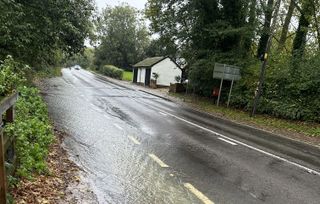Surface water drainage — what is the water runoff law for property in the UK?
It is important now more than ever to take surface water drainage from your home onto the road seriously

With heavy rainfall expected across the UK this winter — the question of legal responsibilities over water runoff from our properties is an important one.
Inadequate surface water drainage can result in discharge of water onto roads and neighbouring properties. If this runoff isn't promptly resolved, it has the potential to cause disputes or legal issues.
Therefore, it is important to have a firm understanding of the legislation surroundingdrainage systemlegal requirements for your property. Here we explain the law on surface water drainage and runoff as well as looking at property owners' responsibilities and what to do to avoid potentially finding yourself in court.
The law on drainage and runoff
What is the law on surface water drainage for homes in the UK?
The law onsurface water drainagein the UK primarily revolves around theFlood and Water Management Act 2010.
This legislation sets out the framework for sustainable surface water drainage, focusing on the prevention of flooding and the management of surface water runoff from homes and developments.
It states: "Construction work which has drainage implications may not be commenced unless a drainage system for the work has been approved by the approving body."
This applies to any kind of building work that might affect surface water drainage, including patios and driveways.
This legislation was introduced in response to significant flooding events, such as the widescale floods of 2007, which caused extensive damage to properties and infrastructure.
Who is responsible for surface water drainage?
Property owners are ultimately responsibility for surface water drainage.
They must ensure that effective drainage systems are in place to manage surface water runoff and prevent flooding on their land and the public highway.
This can be easy to achieve as SuDS technology can be inexpensively incorporated with many fairly cost-effective options like adding one of thebest water butts, aFrench drain,best driveway materialsandpermeable paving诸如此类的porous pavers from B&Q.

What about the law on surface water runoff?
If you don't address surface water runoff from your property, you could potentially find yourself being taken to court. This could be due to failing to install adequate drainage measures during building work and facing enforcement action or simply failing to maintain them - for instance not cleaning out your gutters and drains appropriately and the water runoff damaging a neighbour's property.
However, it isn't quite as simple as any kind of water runoff from your land or property being illegal. This is because there is an allowance for anything considered "natural" runoff, as one local authority, Neath Port Talbot Council, explains in its drainage advice for property owners.
"The general approach is that the landowner is responsible for the land drainage of their land. This can create problems since legally a person owning lower-level ground has to accept natural land drainage water (that is, spring water, ground water or surface water run-off) from adjacent land at a higher level," it explains.
"The exception to this is where the owner of that adjacent land has carried out “improvements” such that the run-off from the land cannot be considered ‘natural’ – for example if the entire back garden has been paved over. Such natural run-off does not include water from gutter drainpipes."
Surface water drainage and your neighbours
What is the right to drain water on neighbours' land?
Oliver Creevy, managing director and co-founder of Insulation Advisor, says the right to drain water onto a neighbour's land can be a complex issue.
Generally, you must obtain the consent of your neighbour to discharge surface water onto their property and legal advice is recommended. However, if this is not possible, you may need to explore alternative drainage solutions, such as SuDS, to manage water on your own land.
Neath Port Talbot Council highlights that there is a right to natural drainage, known as the common law right to drainage, as it explains: "This means that water flowing naturally across the surface of the land is permitted to flow downhill naturally onto your neighbour’s land."
But any kind of interference would mean the flow is no longer considered "natural", as the council's advice continues. "You must not channel the flow of water in such a way as to cause damage to your neighbour’s land. So water falling as rain on your lawn is permitted to flow downhill onto your neighbour’s land but roof water coming from a down pipe is not.," it states. "Similarly your neighbour on the uphill side has a right to let the water flowing naturally across his land to flow onto your land. You must not take any action to prevent such flows."
The one exception is when it comes to taking reasonable action to prevent your land being flooded. "One of the problems with modern urban areas is that construction of obstructions to natural flows such as walls and raised patios can cause neighbouring properties to flood," it adds.

Can I sue my neighbour for water runoff in the UK?
Yes, you have the right to seek legal action against your neighbor if their surface water runoff is causing significant damage to your property.
It's advisable to first attempt to resolve the issue through communication and mediation, but legal action is an option if an agreement cannot be reached.
It's also worth pointing out that if your neighbour's runoff falls under the common law right to drainage in the UK - the principle that a landowner has the right to allow natural surface water to flow from their land onto neighbouring land - then you would be unlikely to have a case against them.
Changes to the surface water drainage laws
How is the law on surface water drainage changing?
Oliver Creevy, from Insulation Advisor, says there have been significant changes in recent years, including the introduction of Sustainable Drainage Systems (SuDS) regulations in 2015.
SuDS are designed to mimic natural drainage and manage surface water at its source, promoting infiltration and reducing flood risk.
Local authorities have been given greater responsibility for approving and enforcing SuDS in new developments,making SuDs a mandatory requirementfor construction and renovation projects.
Get the Homebuilding & Renovating Newsletter
Bring your dream home to life with expert advice, how-to guides and design inspiration, direct to your inbox.
Sam is based in Coventry and has been a news reporter for nearly 20 years. His work has featured in the Mirror, The Sun, MailOnline, the Independent, and news outlets throughout the world. As a copywriter, he has written for clients as diverse as Saint-Gobain, Michelin, Halfords Autocentre, Great British Heating, and Irwin Industrial Tools. During the pandemic, he converted a van into a mini-camper and is currently planning to convert his shed into an office and Star Wars shrine.

